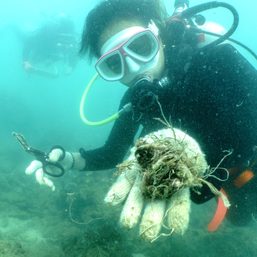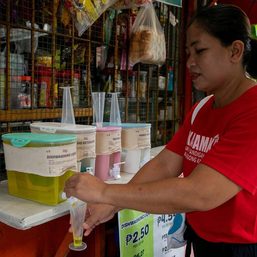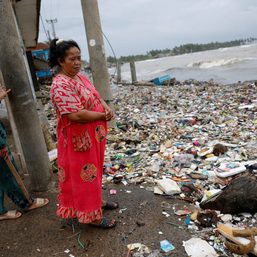SUMMARY
This is AI generated summarization, which may have errors. For context, always refer to the full article.

MANILA, Philippines – The Philippines now has a law requiring large companies to recover the plastic packaging waste they produce, a bid by lawmakers and firms to address the country’s reputation as a top plastic polluter.
The Extended Producer Responsibility Act of 2022, or Republic Act No. 11898, lapsed into law on July 23, 2022. This means it became a law because neither former president Rodrigo Duterte nor President Ferdinand Marcos Jr. signed it 30 days after receipt from Congress.
By allowing it to become a law, Marcos did not give in to the appeal of some green groups for him to veto the measure because of its limitations and concessions to plastic-using firms.
The EPR law is the first amendment to the two-decade-old Ecological Solid Waste Management Act.
Rappler got a copy of the new law on Wednesday, July 27, from the office of Senator Cynthia Villar, who sponsored the measure as Senate chairperson of the Committee on Environment, Natural Resources, and Climate Change in the 18th Congress.
Here’s what you need to know about the EPR law (scroll to the end of the article for a copy of the measure).
The gist
The law requires large enterprises, defined as enterprises with total assets over P1 billion, to recover a certain portion of their plastic packaging waste, or else pay a fine.
Recovery is part of a larger concept of Extended Producer Responsibility (EPR), which means the responsibility of entities to ensure the materials and waste they produce do not end up in landfills or the environment, but can be reused, recycled, or allowed to biodegrade in an ecologically-sound manner.
Many countries, like Japan, Australia and some states in Europe and Latin America implement EPR schemes on a wide scale.

What kind of waste do enterprises have to recover?
The recovery requirement only applies to plastic packaging which includes sachets, labels, laminates, single or multi-layered plastics, beverage and food containers, containers for personal care and cosmetic products, lids and caps, plastic forks and spoons, plates, straws, sticks, tarps, signages, and the like.
Also included are plastic bags and polystyrene, often used to make rigid food containers, foamed cups, plates, and bowls.
What does recovery mean?
Waste recovery means actions that prevent waste from leaking into the environment. According to the law, they include:
- Buying back the material or waste from consumers
- Putting up collection points where the material or waste can be dropped off after consumption then collected for reuse or recycling
- Clean-up of waste from coastal areas, public roads, other places
- Establishment of recycling, composting, thermal treatment, and other waste diversion or disposal facilities
What are the target recovery rates?
The large enterprises must comply with this schedule for target recovery of their plastic footprint:
- December 31, 2023 – Must recover 20% of their plastic footprint the year before
- December 31, 2024 – Must recover 40% of their plastic footprint the year before
- December 31, 2025 – Must recover 50% of their plastic footprint the year before
- December 31, 2026 – Must recover 60% of their plastic footprint the year before
- December 31, 2027 – Must recover 70% of their plastic footprint the year before
- December 31, 2028 and every year after – Must recover 80% of their plastic footprint the year before
What’s the penalty for failure to meet the waste recovery targets?
The large enterprise will have to pay twice the cost of recovery and diversion of their plastic footprint or its shortfall, or the appropriate fine below, whichever is higher:
- P5 million to P10 million – 1st offense
- P10 million to P15 million – 2nd offense
- P15 million to P20 million – 3rd offense
The Department of Environment and Natural Resources’ (DENR’s) Pollution Adjudication Board will hear and judge cases of alleged violations and impose the fines.
The same fines listed above will be the penalties for an enterprise’s failure to register their EPR program on time.
How will this be implemented?
First, large enterprises must come up with their EPR program and register it with the government, specifically the National Solid Waste Commission (NSWC) under the DENR. They must do this within six months of the law’s effectivity.
When they register their EPR program, they must include information like the person responsible for EPR in the company, the type of plastic packaging they use, “verifiable volume or weight” of the plastic packaging brought into the market within a specified period, the target volume or weight of plastic packaging for recovery, how they label packaging materials to facilitate recovery or proper disposal, and more.
The enterprises are to get an “independent third-party” auditor to certify the veracity of their reported plastic product footprint and their compliance with EPR targets using “uniform standards” established by the DENR. The audit report must be submitted to the DENR and should be posted by the DENR on a website accessible to the public.
Producer Responsibility Organization
Many companies might not have lots of experience in implementing EPR schemes so the law allows large enterprises to tap what’s called a Producer Responsibility Organization (PRO).
A PRO is an entity that will help the enterprises implement EPR and would likely be firms or groups that have experience in recycling, waste recovery, reuse, or other EPR-type of initiatives.
Multiple companies can come together to form a PRO using shared resources.
Information on an enterprise’s PRO must also be included in their registration of their EPR program with the government.
The guard dog and information manager: National Ecology Center
The law creates a sub-grouping within the NSWC, called the National Ecology Center or NEC.
The NEC, to be headed by the Environmental Management Bureau assistant director, is supposed to keep close tabs on the implementation of enterprises’ EPR schemes and the overall impact of the law.
Its responsibilities include:
- Maintain the registry of EPR programs submitted by enterprises
- Monitor and evaluate compliance to the EPR program registration requirement
- Take action on complaints from any citizen against a large enterprise, PRO, waste generator, or any waste management entity
- Within one year of the law’s effectivity, provide an assessment of the volume or footprint of other generated wastes, for priority inclusion in the country’s EPR scheme
- Create a database showing the rate of recovery of all types of plastic waste; list of processors and recycling entities, the materials they buy or recycle, and at what prices they buy them
- Conduct training on ecological solid waste management
- Promote the development of a “recycling market” built on a national network of groups and entities that will make recycling easier to do for everyone
Financial incentives for enterprises
Apart from penalties, the law also hopes to encourage EPR schemes through a reward system.
Large enterprises can apply for tax incentives for their EPR activities, under the section on tax incentives of the National Internal Revenue Code. The EPR expenses of large enterprises and other private enterprises that volunteer to do EPR schemes will be considered “necessary expenses deductible from gross income,” subject to substantiation requirements under the tax code.
National Framework for EPR
The law encourages a shift to an EPR mindset by introducing a framework for this way of dealing with waste.
The framework calls on all sectors to lessen the use of products or materials that are bad for the environment and redesign products in a way that makes them reusable, recyclable, or retrievable.
It encourages things like product refilling systems for retailers, in place of “tingi-tingi” system where products are individually sold in new disposable wrappers. It wants products to have labels that show consumers how they can properly dispose of the product or ensure it is retrieved by the company that made it.
Why do some green groups oppose this law?
Some of the most active groups against plastic pollution, Greenpeace, Ecowaste Coalition, and Break Free From Plastic Movement, wanted Marcos to veto this bill.
They think the law would just give plastic-dependent companies an excuse to use more plastic since, anyway, they are just required to recover those materials after their products are bought and consumed.
Environmental advocates who oppose the measure prefer a nationwide ban on single-use plastic, which, they point out, has been successfully implemented by cities on their own.
They resent that EPR schemes are only required for large companies, and not enterprises of all sizes. They also point to how the law’s mention of “thermal treatment” and “processing” of plastic wastes might lead to more widespread use of pollutive technologies like incineration, pyrolysis, or waste-to-fuel.
– Rappler.com
Add a comment
How does this make you feel?















There are no comments yet. Add your comment to start the conversation.